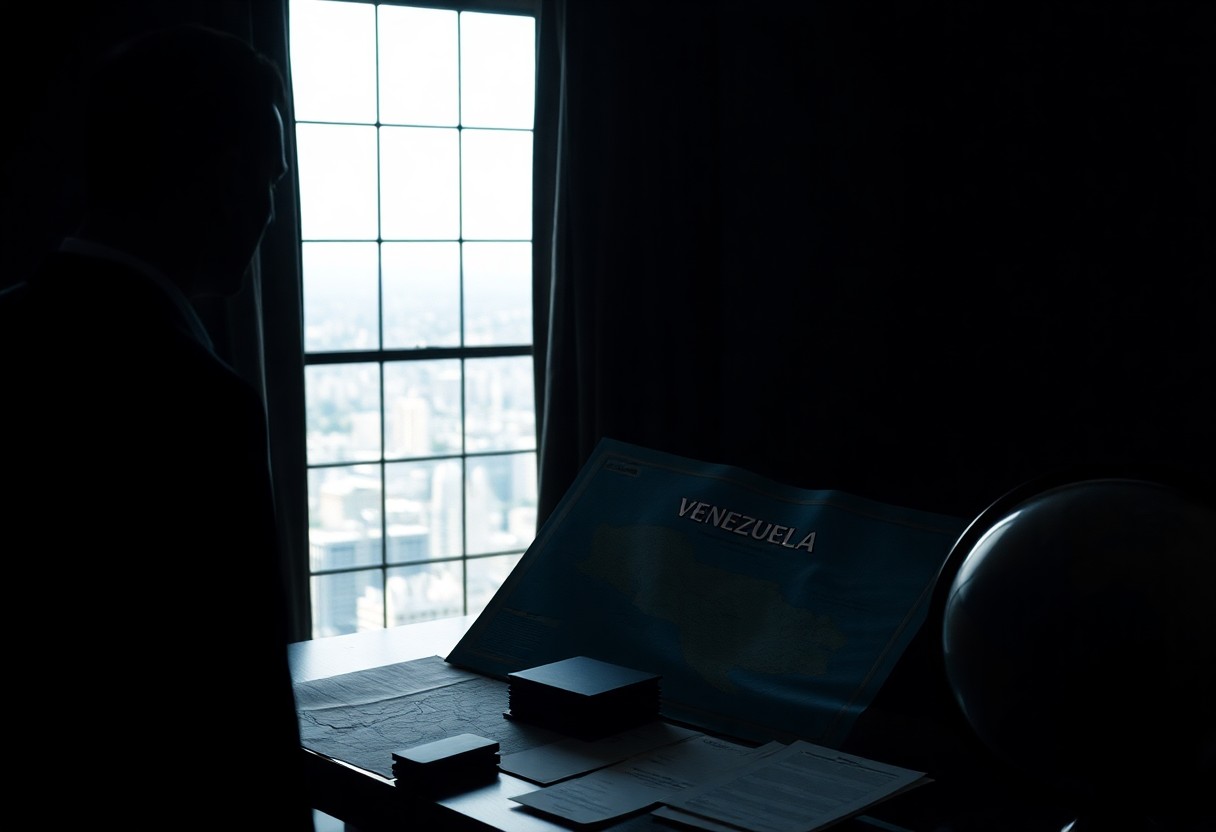Maduro’s hold on power in Venezuela has sparked intense scrutiny and speculation around potential covert efforts aimed at displacing him. As you research into the complex political landscape, it’s crucial to recognize the dangerous ramifications of any such maneuvers, not just for Venezuela, but for regional stability as well. You will uncover the intricate web of international interests and the possibility of both positive and negative outcomes as foreign powers navigate this volatile situation. Understanding these dynamics is key to grasping the future of Venezuela’s governance and its people.
Historical Context of Venezuela’s Political Turmoil
Your understanding of Venezuela’s current political unrest requires a look back at the historical context, which is marked by a series of socio-economic challenges, governmental changes, and deep-seated political divisions. Since the late Hugo Chávez’s rise to power in the late ’90s, Venezuela has experienced polarization, moving from relative oil wealth to crippling shortages and rampant inflation. This backdrop set the stage for the turbulent years that followed and shaped the landscape for current tensions surrounding Nicolás Maduro’s regime.
Overview of Maduro’s Regime
Against the backdrop of economic collapse and political discontent, Nicolás Maduro ascended to power following Chávez’s death in 2013. His leadership has been characterized by increasing authoritarianism, major human rights violations, and a struggle to maintain control amidst escalating crises. Despite initial attempts to solidify his authority, Maduro’s regime has faced mounting criticism both domestically and internationally, limiting his ability to govern effectively.
Key Events Leading to Current Tensions
Overview of the key events that have heightened tensions in Venezuela reveals a sequence of social unrest, opposition attempts, and government crackdowns. Major protests erupted in 2014 against the Maduro administration due to economic hardships, leading to significant violence. The 2018 election, widely regarded as fraudulent, further ignited discontent, prompting Juan Guaidó to declare himself interim president in 2019. This bold move led to international support for Guaidó and intensified internal conflict, as Maduro’s government stubbornly clung to power amidst increasing sanctions and humanitarian crises.
Another significant development has been the exacerbation of economic collapse, marked by hyperinflation and widespread shortages of food and medicine. The mass exodus of Venezuelans fleeing the crisis has compounded the situation, straining resources in neighboring countries. The ongoing battle between Maduro and Guaidó continues to create a volatile environment, fueling speculation about potential interventions and the future of Venezuela’s governance. These events illustrate the precarious state of affairs, where each movement could tip the balance towards significant change or further chaos.
International Response to the Venezuelan Crisis
If you take a closer look at the Venezuelan crisis, you’ll find that international responses have varied significantly. Countries around the world have expressed their views, leading to a complex landscape of geopolitical interests, humanitarian concerns, and economic implications that impact both Venezuela and neighboring regions.
Sanctions and Diplomatic Pressure
To address the crisis, numerous nations have imposed sanctions and increased diplomatic pressure on the Maduro regime. These measures aim to punish human rights abuses and deter corruption, while also rallying support for opposition leaders, with the hope of restoring democracy in Venezuela.
Role of Regional and Global Powers
Across the geopolitical spectrum, both regional and global powers have become heavily involved in the Venezuelan crisis, each aiming to influence the outcome based on their strategic interests. Countries such as the United States, Brazil, and Colombia have taken a stand against Maduro’s government, advocating for democratic reforms and humanitarian aid. Conversely, Russia and China have provided support to Maduro, complicating the situation and reflecting their interest in countering Western influence. This tug-of-war highlights how critical the involvement of major powers is in shaping Venezuela’s future.
Even as major players take sides, your understanding of the situation can deepen when you consider the implications of foreign interventions. While Western nations push for regime change, they may inadvertently escalate tensions, jeopardizing peace and stability in the region. In contrast, support from nations like Russia and China serves to bolster Maduro’s regime, potentially prolonging the crisis. This dynamics showcases that the actions of regional and global powers not only influence Venezuela but also affect broader international relations.
Analysis of Covert Operations
Some covert operations aim to replace regimes while avoiding direct conflict. Analyzing these operations reveals the complexity behind targeting leadership, as they involve silent manipulation of events to achieve political outcomes.
Types of Covert Maneuvers
Some common types of covert operations include:
- Assassination of key figures
- Subversion of political groups
- Disinformation campaigns
- Economic sabotage
- Support of insurgencies
After assessing various techniques, it’s clear that these operations can significantly influence a nation’s stability.
| Covert Maneuver | Description |
|---|---|
| Assassination | Eliminating a leader to create a power vacuum. |
| Subversion | Undermining government authority from within. |
| Disinformation | Spreading false information to mislead the public. |
| Economic Sabotage | Disrupting economic stability to incite unrest. |
| Support of Insurgencies | Backing rebel groups striving for regime change. |
Known Instances and Allegations
Across history, numerous allegations implicate covert operations aimed at destabilizing Venezuela under Maduro. Reports suggest involvement of foreign entities, including potential support for opposition groups, which complicates the nation’s political landscape.
Hence, you can observe various instances where foreign interference has been documented, ranging from support for protests to attempts at military intervention. These actions are often met with vehement denials yet remain under intense scrutiny. Overall, the dynamic involves significant risks, as the potential for a humanitarian crisis escalates with any overt measures taken against a sitting government.
Domestic Factors Influencing Displacement
Many factors within Venezuela itself are shaping the potential for Maduro’s displacement. Among these domestic dynamics are:
- Political instability
- Public dissatisfaction
- Opposition strength
Thou must consider how these elements intertwine to challenge Maduro’s authority.
Opposition Movements
Below, you can observe that various opposition movements have gained momentum, significantly impacting Maduro’s regime. These groups are increasingly uniting to challenge the government, advocating for democratic reforms and human rights. They play a pivotal role in galvanizing public support and fostering discontent with the current administration.
Economic Conditions
For many Venezuelans, the economic conditions have become a driving force behind calls for change. You may find it alarming that hyperinflation and severe shortages of basic goods have created widespread discontent. These issues threaten your daily life and the overall stability of the nation.
Economic turmoil in Venezuela has reached alarming levels, with hyperinflation eroding savings and leaving many struggling to afford basic necessities. The country’s once-thriving oil industry faces collapse, leading to increased unemployment and desperation among citizens. As you navigate this crisis, understanding that such harsh economic realities stoke fears and frustrations may help you appreciate the urgency for a change in leadership. Increased external pressures and internal unrest could ultimately signal a turning point for Venezuela.

The Role of Media and Information Warfare
To understand the dynamics surrounding Venezuela’s political landscape, you must examine the role of media and information warfare. This realm is often leveraged by various actors to shape public perception, influence opinions, and ultimately sway power. Through strategic communication and control of narratives, different factions actively engage in efforts to destabilize the current regime and promote alternative leadership.
Propaganda Tactics
Warfare in the information domain employs sophisticated propaganda tactics intended to create a favorable environment for change. Your attention is drawn to carefully crafted messages that amplify dissent and highlight the failures of the Maduro government. These tactics are designed not only to inform but to evoke emotional responses that spur collective action among citizens.
Disinformation Campaigns
Media manipulation plays a significant role in undermining the credibility of the current government through targeted disinformation campaigns. You might encounter false narratives circulated across social media and news outlets that paint a distorted picture of the reality on the ground, with the aim of eroding public trust in state institutions.
The disinformation campaigns surrounding Venezuela’s political crisis often rely on sensationalized news reports and highly shared online content that misrepresents facts. When you engage with this information, it’s vital to discern the source and intent behind what you read. These strategies can lead to polarized views, heightening tensions and exacerbating societal divides. Furthermore, such initiatives may create a false sense of hope or despair, manipulating your perceptions of potential outcomes. Understanding the scope and dangers posed by disinformation will empower you to navigate this complex landscape more effectively.
Potential Outcomes and Implications
Not every maneuver to dethrone Venezuela’s Maduro guarantees success. The recent episode involving an Ex-Green Beret led failed attempt to oust Venezuela’s … highlights the tenuous nature of outside interventions. As various factions vie for power, the potential for internal strife, humanitarian crises, and geopolitical instability looms large, which could reshape the entirety of South America’s political landscape.
Scenarios for Maduro’s Future
About the future, several scenarios may unfold for Maduro. He could either consolidate power through increased repression or face a decline due to growing discontent. External pressures might force negotiations, but the effectiveness of these approaches remains uncertain. Each path carries significant ramifications for the Venezuelan populace and regional allies.
Impact on Regional Stability
About the implications for regional stability, the outcomes of actions against Maduro directly influence neighboring countries. As you consider the situation, instability in Venezuela could lead to mass migrations, economic strain, and heightened tensions in surrounding nations, particularly Colombia and Brazil. The risk of increased political turmoil and criminal activity in these regions cannot be ignored.
At the same time, successful maneuvers against Maduro may inspire other authoritarian regimes to reconsider their strategies but could also lead to a power vacuum, increasing the chances of extremist groups gaining influence. Your understanding of this complex scenario should underline that the stakes are not just about Venezuela; they resonate across Latin America and have broader implications for global security.
To wrap up
Upon reflecting on the intricate geopolitical landscape surrounding Venezuela, you may find compelling evidence suggesting that a covert maneuver to displace Maduro is indeed in play. The interplay of international alliances, economic sanctions, and intelligence operations illuminates the motivations behind such actions. As you examine this complex situation, consider how global dynamics shape not just Venezuela’s future, but also the implications for regional stability and international relations. Your awareness of these factors equips you to better understand the potential outcomes of these covert efforts.





0 Comments